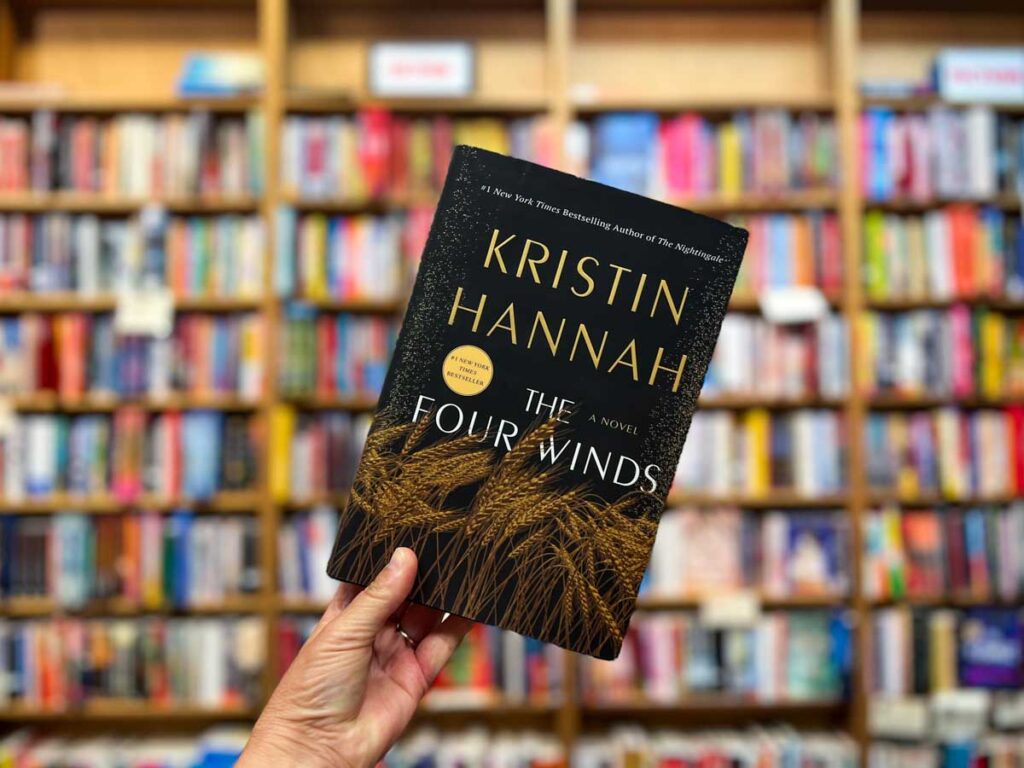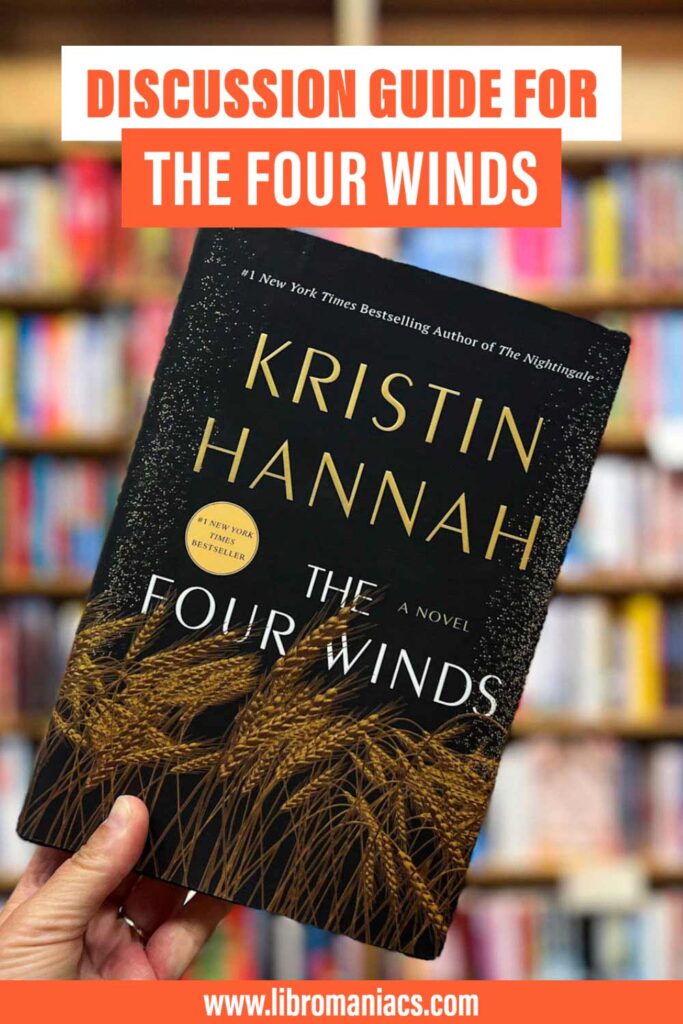From the dry Texas panhandle to California’s golden valleys, Elsa Wolcott leads us on a tumultuous journey through the Great Depression and the Dust Bowl. With our book club questions for The Four Winds, get ready to explore questions about love, loss, courage, discrimination, and determination. Elsa struggles with rejection, learning how to love and be loved, and finds her identity through the challenges of raising a family during the bleak monotony and hard work of farming during the dust bowl. Eventually she’s forced to journey to California, where she struggles to fight for her family’s right to work and receive respect. Kristin Hannah delivers a story with rich characters and scenery that makes this book hard to put down.

This The Four Winds discussion guide contains resources to help you get the most out of this book. Start with the book synopsis, and get your discussion moving with The Four Winds book club questions and selected reviews from other readers. If you are looking for further reading about the Dust Bowl, Great Depression, or strong women overcoming obstacles, read on for our suggestions for three related reads.
(This article contains affiliate links. This means that if you choose to purchase, I’ll make a small commission.)
The Four Winds Synopsis
The Four Winds, Kristin Hannah
“My land tells its story if you listen. The story of our family.”
Texas, 1921. A time of abundance. The Great War is over, the bounty of the land is plentiful, and America is on the brink of a new and optimistic era. But for Elsa Wolcott, deemed too old to marry in a time when marriage is a woman’s only option, the future seems bleak. Until the night she meets Rafe Martinelli and decides to change the direction of her life. With her reputation in ruin, there is only one respectable choice: marriage to a man she barely knows.
By 1934, the world has changed; millions are out of work and drought has devastated the Great Plains. Farmers are fighting to keep their land and their livelihoods as crops fail and water dries up and the earth cracks open. Dust storms roll relentlessly across the plains. Everything on the Martinelli farm is dying, including Elsa’s tenuous marriage; each day is a desperate battle against nature and a fight to keep her children alive.
In this uncertain and perilous time, Elsa—like so many of her neighbors—must make an agonizing choice: fight for the land she loves or leave it behind and go west, to California, in search of a better life for her family.
The Four Winds is a rich, sweeping novel that stunningly brings to life the Great Depression and the people who lived through it—the harsh realities that divided us as a nation and the enduring battle between the haves and the have-nots. A testament to hope, resilience, and the strength of the human spirit to survive adversity, The Four Winds is an indelible portrait of America and the American dream, as seen through the eyes of one indomitable woman whose courage and sacrifice will come to define a generation.
10 The Four Winds Book Club Questions
- “Don’t worry about dying, Elsa. Worry about not living. Be brave.” These words from Elsa’s Grandfather stuck with her throughout her life. Elsa never had high self esteem, so how did she show her bravery throughout her life?
- “Elsa felt a deeply rooted shame in her daughter’s rejection. In her hurt, she did what she’d always done: she disappeared. But all the while, she waited, prayed, that both her husband and her daughter would someday see how much she loved them and they would love her in return. Until then, she dared not push too hard or demand too much.”
Elsa’s childhood taught her that she didn’t deserve much, training her to fade into the background in order to deal with rejection. How would her life and her relationships have been different if she’d asserted herself more? Would her relationship with Rafe have been different? - Do you think Elsa was heroic? What do you think you would’ve done if faced with her challenges?
- “Jack says that I am a warrior and, while I don’t believe it, I know this: A warrior believes in an end she can’t see and fights for it. A warrior never gives up. A warrior fights for those weaker than herself. It sounds like motherhood to me.”
Motherhood changed Elsa completely. And she had experienced many different mothering types–her own mothers coldness and rejections, Rose’s adoptive and enduring love, and her own fierce love for her children. How did these different experiences change Elsa, and influence her life’s path? What do these different experiences say about motherhood? - What do you think of Rafe’s decision to leave? Do you feel empathy for him, or think he was selfish? Do you think his children will ever see him again?
- What do you think about the representation of communism in California? What brought the workers to that point, and would it have helped them?
- Lorena came of age during a difficult time. How did she grow to embody aspects of both her mother and father?
- “The four winds have blown us here, people from all across the country, to the very end of this great land. And now, at last, we make our stand, fight for what we know to be right. We fight for our American dream, that it will be possible again.”
Many characters in this book seek the American dream– from Rose and Tony, to Rafe, Elsa, Loreda, and many of the other farmers and workers. What does achieving the American dream mean to these characters? How do they view it differently? How do you view it? - The land features prominently in this book, ownership, hardship, and travel. How does the ownership of land affect the decisions of characters in this book? How does it play into discrimination?
- The Great Depression was a greatly challenging time for nearly everyone in the United States. How do you think Americans would deal with these challenges if it happened now? How did the challenges of the COVID pandemic or the 2008 recession compare?
Selected Reviews for The Four Winds
“…this book did touch me in many ways. I went online to find out more about the drought and “Dust Bowl” and realized how little I had known. This book opened my eyes to the farmer’s tragedy. I had read much about The Great Depression but not much about the farmer’s plight.
“…Perhaps the biggest problem I had with The Four Winds is that once Elsa sets off for California, it follows The Grapes of Wrath almost beat for beat. Long drive across the desert: check. Mean store owners: check. Squatter’s camp full of helpful common folk: check. A flood: check. Unfortunately, while The Grapes of Wrath felt journalistic in its detail, The Four Winds feels like a superficial and too-glossy copycat. Whereas John Steinbeck marinated you in detail and context, Hannah simplifies everything to good versus evil.”
“If there is a saving grace in The Four Winds, it is Elsa herself. I give Hannah credit for trying something a bit ambitious, by centering her epic on a wallflower. Elsa’s arc, from shrinking violet to something more, gives this book its spine. There were times, I should add, that I totally believed in Elsa’s journey. The problem is that the world around her, and the people in it, all struck me as curiously lifeless cutouts. Reading this was like walking onto a studio backlot of a western town, where the facades of the buildings give the impression of a tactile reality.”
“Started out loving this book, great voice (which is the most important part of writing) , great craft, endearing characters, and excellent setting. Vivid writing. The setting easily has equal weight with a main character. More so, it’s a great antagonist […] But the story turned into a little bit of a slog only because of the constant depressing tone. […] As a reader I began to feel battered with the constant barrage of evil put upon these characters.
3 Books Like The Four Winds
This book was a fave of the Jenna Bush Jagar’s book club. She does a fine job of tapping into book clubber’s zeitgeist. If you like her pics, then check out our complete list of Jenna’s pics, ranked by ratings. Pachinko is another sprawling family epic (for which we have a reading guide). And if you want more of Kristin Hannah, we also have a guide for The Great Alone and The Women.
If you are keen to read more fiction set in The Depression, then check out our guide for West With Giraffes or The Heaven & Earth Grocery Store.

The Grapes of Wrath, John Steinbeck
Considered one of the great classic American novels, The Grapes of Wrath by John Steinbeck is not to be missed for a rich and thought provoking tale about America during the Great Depression and the Dust Bowl.
Following the Joad family from their farm in Oklahoma to the promise of work in California, we experience the struggles of failed farming, the hopeful and difficult journey, and the labor struggle in California. Steinbeck gives us a powerful and evocative picture of America’s relationship to the land, class struggles, and the complexities of capitalism.

The Worst Hard Time: The Untold Story of Those Who Survived the Great American Dust Bowl, Timothy Eagan
If you are interested in reading more about what life was like during the Dust Bowl, look no further than Timothy Egan’s The Worst Hard Time.
This non-fiction book follows the stories of dozens of families through the hardships of living through this period of natural disasters. Egan draws together the importance of learning from our mistakes, respecting nature, and understanding the human toll of this historical time period.

I Will Send Rain, Rae Meadows
This story follows the Bell family as they struggle to survive on their Oklahoma farm during the Dust Bowl. Drawn apart by dreams, illness, and thoughts of escape, this family fights to survive and stay while many others in their position are leaving. I Will Send Rain offers a beautifully written portrait of family life during a period of intense turmoil, similar to The Four Winds.
Have a listen on Audible. Try audio books for free for 30 days.
Share these book club questions for The Four Winds with your friends:

